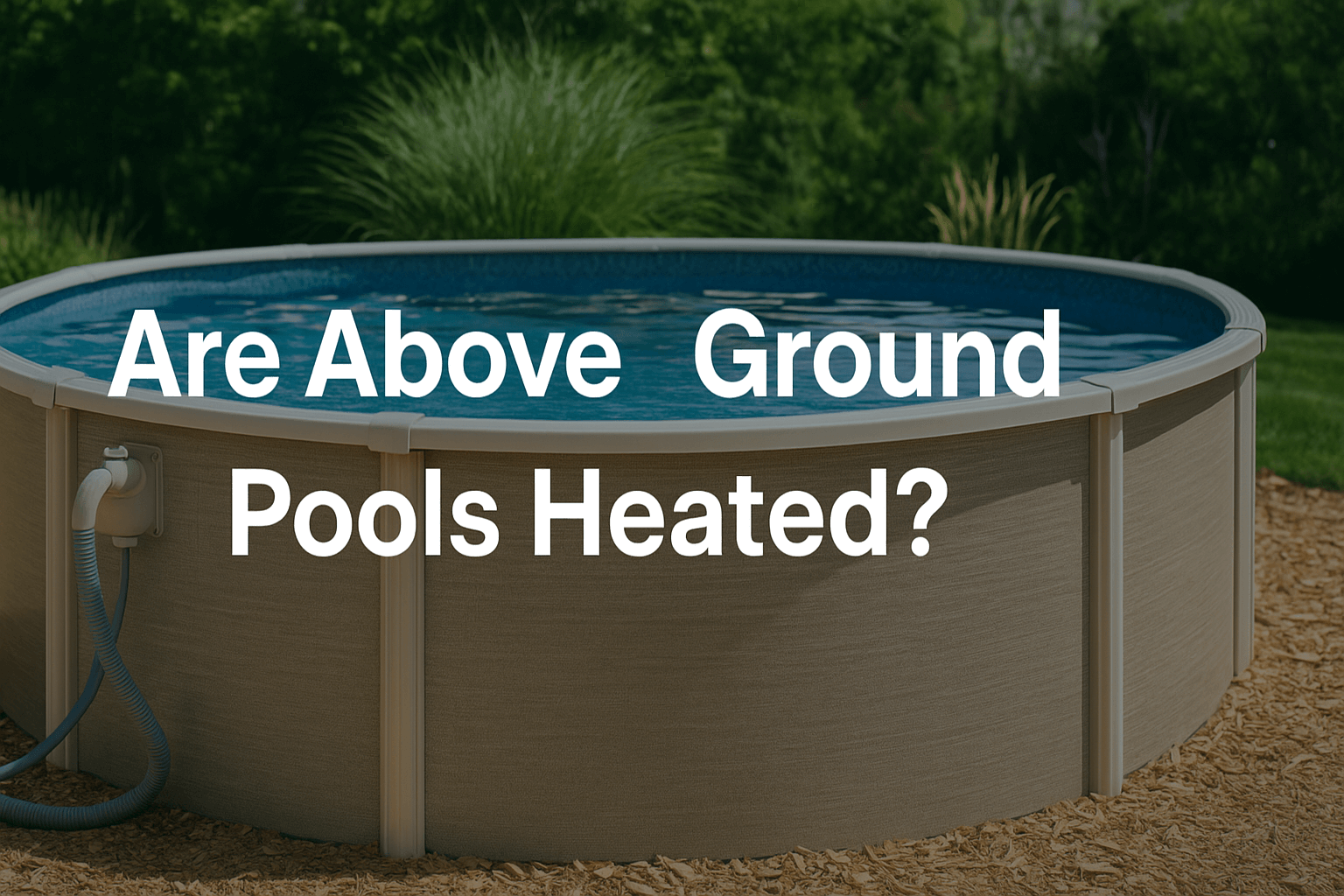
Are Above Ground Pools Heated?
Ever dreamed of a warm dip without the in-ground drama?
Good news: yes, above ground pools can be heated — thanks to handy gadgets like a pool heater. Whether it's sunshine, electricity or gas doing the work, we’ll dive into your best options (and bust a few myths while we're at it).
How Above Ground Pools Naturally Heat Up
Dependence on Sunlight and Ambient Air Temperature
On a sunny afternoon, your above ground pool can warm up quite nicely.
It soaks up heat from the sun and surrounding air, especially if it’s out in the open.
But let’s be honest — this is the UK.
The sunshine doesn’t always get the memo.
Warm days are rare, and when the sun does show up, it doesn’t always stick around. That means natural heating can be a bit hit and miss.
Factors Affecting Natural Water Temperature (Shade, Wind, Climate)
Got trees nearby? Tall fencing? A neighbour’s garden gnome casting shade?
Anything blocking sunlight will cool your pool.
Wind also plays a sneaky role — it whips heat off the water surface faster than you’d think.
Live in a breezy coastal spot or a shady suburb?
You’ll definitely notice cooler water.
Combine all that with unpredictable UK weather, and relying on natural heat alone can feel like rolling the dice.

Why Many Pool Owners Choose to Heat Their Pools
Extending the Swimming Season (Spring to Fall)
Without heating, your pool might only be usable for 6–8 weeks a year.
With heating? You could be swimming from April to October.
Imagine your kids splashing around on a bright spring afternoon — or you sneaking in a cheeky autumn dip while the leaves fall.
Enhancing Comfort and Enjoyment
Let’s face it — cold water is not for everyone.
A warm pool is like an open invite.
Friends stay longer. Kids whine less. You actually want to jump in.
And suddenly, that pool is more than a novelty — it’s the heart of your garden.
Making Early Morning or Late Evening Swims Possible
Ever wanted a quick swim before work? Or a late-night dip under the stars?
A heater makes that happen — no shivering required.
You’re not at the mercy of daylight anymore.
The pool is ready when you are.
Can Above Ground Pools Be Heated? Exploring Effective Methods
Active Pool Heating Systems
Solar Pool Heaters (Panels or Mats)
Solar pool heaters use panels or mats to soak up the sun’s rays and transfer that warmth into your pool water.
Advantages (Eco-Friendly, Low Operating Cost)
They’re brilliant if you love a green solution.
No ongoing fuel bills, minimal upkeep, and they last for years.
Plus, they’re totally silent — just quietly doing their thing while the sun’s out.
Disadvantages (Weather Dependent, Slower Heating)
But they do have one big weakness: clouds.
If the weather turns grey (which, let’s be honest, it often does), they struggle.
You’ll need patience — and backup if you want consistent warmth.

Electric Pool Heaters
Electric heaters work much like a giant kettle, heating water as it passes through.
Advantages (Compact, Consistent Heating for Smaller Pools)
They’re great for smaller pools.
Compact, easy to install, and they deliver steady heat.
Ideal for families who just want quick, simple warmth.
Disadvantages (Higher Operating Costs, Slower for Larger Pools)
But they’re not cheap to run, especially if you’ve got a bigger pool.
And if you’re trying to heat up a large body of water fast? You might be waiting a while.
Pool Heat Pumps
These clever systems pull warmth from the air — even when it’s chilly — and push it into your pool.
Advantages (Energy-Efficient, Good for Extending Seasons)
Heat pumps are a favourite in the UK.
They’re energy-efficient, perfect for spring and autumn, and great if you want to swim regularly.
Disadvantages (Higher Initial Cost, Relies on Air Temperature)
You’ll need to invest a bit more upfront.
And if the air gets too cold, they’re less effective — though not useless.
Gas Pool Heaters (Propane or Natural Gas)
Gas heaters are the speedsters of pool heating.
They use propane or natural gas to warm the water lightning fast.
Advantages (Fastest Heating, Independent of Weather)
They’re not picky about sunshine or temperature.
If you want your pool warm now, gas delivers.
Perfect for spontaneous weekend swims.
Disadvantages (Highest Operating Costs, Environmental Impact)
But they burn through fuel — and money — quickly.
Plus, they’re the least eco-friendly of the bunch.
Passive Heating and Heat Retention Methods
Solar Covers or Solar Blankets
Absorbing Sun's Energy and Preventing Evaporation
A solar blanket sits on your pool like cling film.
It traps the sun’s warmth and stops heat from escaping overnight.
Significant Heat Retention and Cost Savings
They’re surprisingly effective — and they save on energy bills too.
Think of them as a sleeping bag for your pool.
Solar Sun Rings and Liquid Solar Covers
Not a fan of full covers?
Solar rings float on the surface and soak up heat in smaller patches.
Liquid covers, on the other hand, form an invisible layer that reduces evaporation.
Both are low-effort, but they work best alongside other methods.
Pool Enclosures or Domes (Trapping Heat and Blocking Wind)
A pool dome acts like a mini greenhouse.
It traps warmth and shields your pool from chilly breezes.
It’s not just about heat either — it keeps leaves, bugs, and curious pets out too.

Optimising Heating Efficiency and Cost
Factors to Consider When Choosing a Heating Method
Pool Size and Volume
Big pool? You’ll need a beefier heater.
Small pool? You’ve got more options.
Size matters when it comes to heating speed and cost.
Your Local Climate and Desired Water Temperature
If you’re in the south with sunnier weather, solar might be enough.
Up north or by the coast? You’ll probably want a stronger backup.
And how warm do you want it? A pleasant 26°C? Or hot tub vibes at 30+?
Upfront vs. Long-Term Operating Costs
Solar’s pricey upfront but cheap to run.
Gas is the opposite.
Electric and heat pumps sit somewhere in the middle.
Think about your long game — not just the installation bill.
Environmental Impact and Energy Source Availability
Keen to stay green?
Solar and heat pumps are your friends.
If your area lacks mains gas, propane might be the only option — but it’s bulkier and needs storage.
Maximising Heating Efficiency
Always Using a Solar Cover When Not in Use
This one’s simple but powerful.
Pop a solar cover on whenever you’re not swimming.
It keeps heat in and reduces evaporation — saving energy (and money).
Shielding the Pool from Wind
Wind steals heat fast.
A fence, hedge, or even a row of planters can make a huge difference.
Block that breeze, and your pool stays warmer for longer.
Proper Sizing of Heating Equipment to Pool Volume
Too small, and your heater will struggle.
Too big, and you’ll waste energy.
Make sure your system matches your pool’s size — it’s worth the extra planning.
Have you checked out our other posts?
Can You Heat Above Ground Pools?


Leave a comment